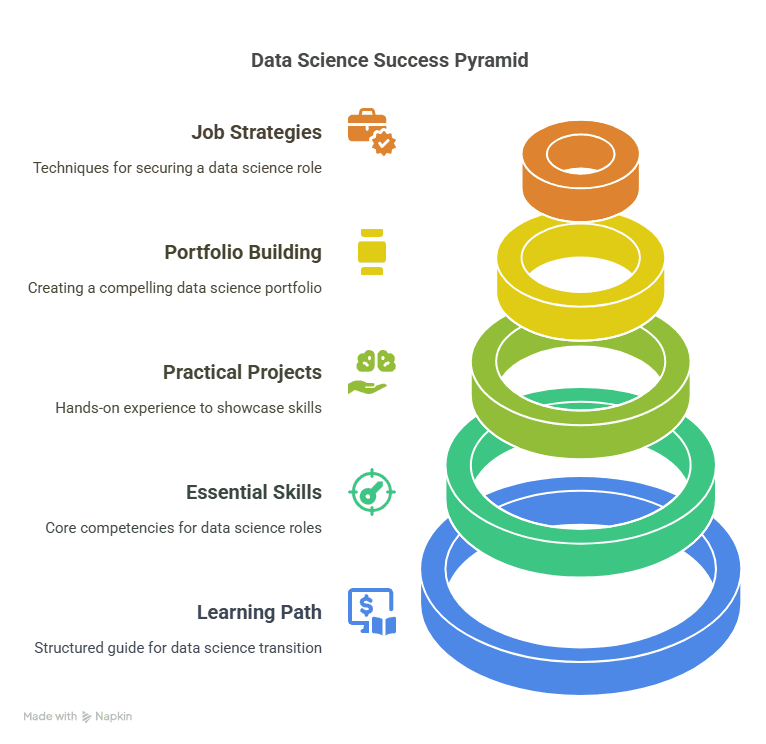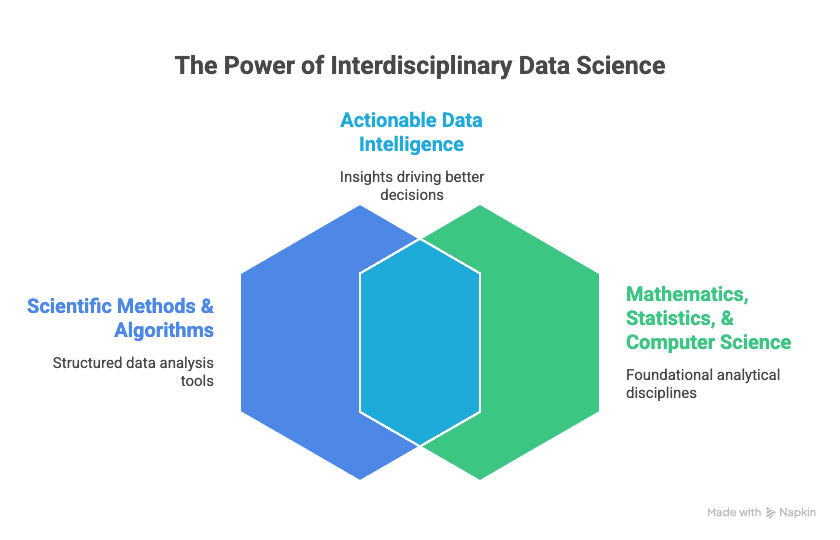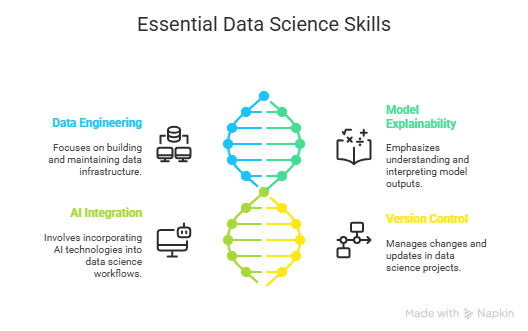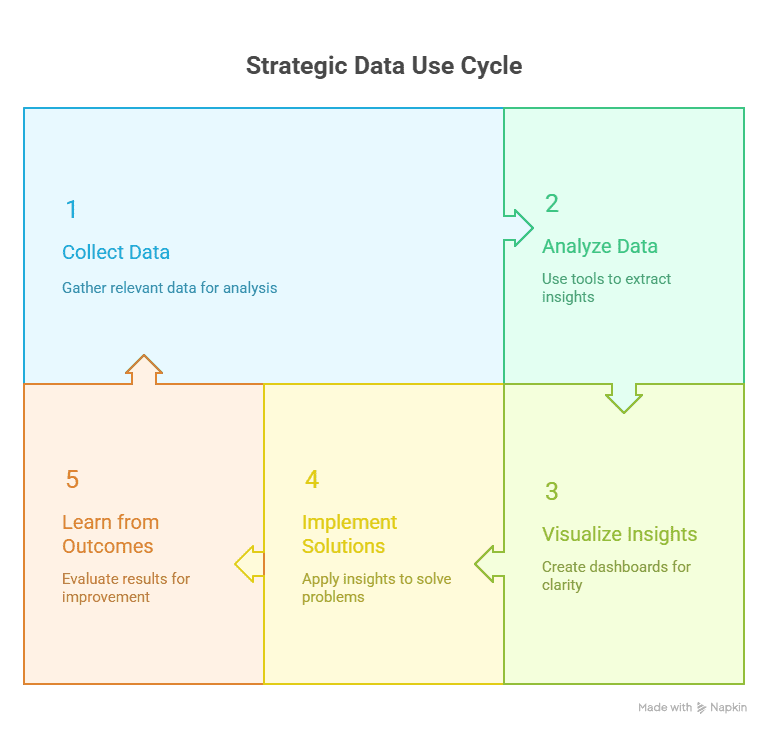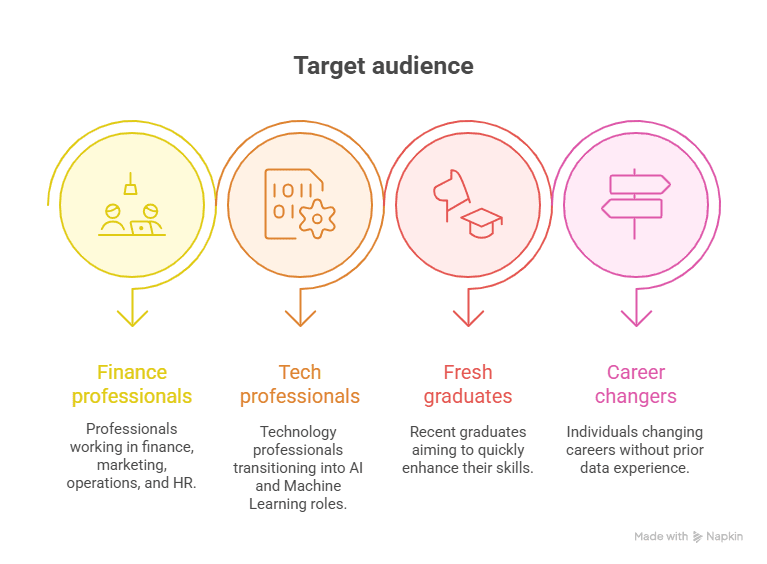With a world where computers can foretell our next buy, identify diseases, and even create music, the marriage of AI and Data Science is not so much a trend but a revolution.
Table of Contents
- Introduction: A New Era of Intelligence
- AI and Data Science Jobs: What’s Driving the Demand?
- Data Science and AI Courses: Your Gateway to Future Skills
- Artificial Intelligence Career Opportunities in 2025 and Beyond
- AI Skills for Beginners: What You Need to Start Strong
- The Future of Data Science: Trends, Tools, and Transformation
- Key Takeaways
- Frequently Asked Questions (FAQs)
- Conclusion
Introduction: A New Era of Intelligence
We’re no longer living in a time when simply being “tech-savvy” is enough to give you a competitive advantage. Now, AI and Data Science are re-writing the rulebook on how industries conduct business, solve problems, and drive growth. From medicine and finance to entertainment and education, these technologies are making their way into every industry at warp speed.
And here’s the big surprise — it’s not only data scientists or AI researchers who have to adjust. Whether you’re a marketer, a supply chain expert, or an aspiring entrepreneur, AI and Data Science knowledge is becoming the new norm. The question isn’t whether they will impact your work — it’s when and how much.

AI and Data Science Jobs: What’s Driving the Demand?
India is quickly establishing itself as a major global player in digital innovation in general.. & AI and Data Science are pivotal to that change. The Indian government has already propelled initiatives like -Digital India and National AI Strategy & demand for AI talent is soaring across a variety of sectors, including fintech, healthcare, agritech and e-commerce.
Indian firms are no longer merely outsourcing IT work; they are now establishing sophisticated AI capabilities internally. This has created a huge demand for qualified professionals who can clean and analyze data, model data, develop AI systems, and extract actionable insights.
Here’s a snap view of Indian job trends now:
| Job Role | Average Salary (INR) | Growth Projection (Next 5 Years) |
| Data Scientist | ₹10–15 LPA | +40% |
| Machine Learning Engineer | ₹12–18 LPA | +45% |
| AI Researcher | ₹15–22 LPA | +42% |
| Data Analyst | ₹6–10 LPA | +35% |
| AI Product Manager | ₹18–30 LPA | +38% |
External Source: Analytics India Magazine Salary Report
Data Science and AI Courses: Your Gateway to Future Skills
Regardless of your background — finance, marketing, IT, or even humanities — shifting into this career path is perfectly doable with the proper learning course. Data science and AI courses can make you go from zero to career-ready in less than a year.
Search for courses that provide a combination of theory, practical tools, and actual projects. Frameworks such as Python, TensorFlow, and SQL must be non-negotiable in any course.
What to look for in a quality course?
- Powerful industry-aligned curriculum
- Live mentorship sessions
- Real-time projects and datasets
- Certifications from recognized institutions
- Job placement assistance
Ready to start your AI & data science career? Explore the Postgraduate Program in Data Science and Analytics by Imarticus Learning — your gateway to an future-proof job.
Artificial Intelligence Career Opportunities in 2025 and Beyond
While AI was once relegated to the sidelines, it’s now a mainstream career path with many different avenues — from automation and robotics to business intelligence and computer vision. What’s shifting, though, is who can enter.Widespread adoption of AI and Data Science means there is no longer only demand for coders, but also for project managers, strategists, and domain experts who can collaborate with AI tools to address business issues.
Top emerging career paths:
- AI Ethics and Policy Specialist
- AI Business Strategist
- Data-Centric Product Manager
- Deep Learning Engineer
- Natural Language Processing Expert
External Source: Forbes – AI Career Paths
AI Skills for Beginners: What You Need to Start Strong
Entering AI does not require a PhD or five years of coding. Most of the essential AI skills for beginners are straightforward to acquire using proper resources, curiosity, and consistency.
Begin with the basics — consider linear regression, classification, supervised learning — and then proceed to advanced architectures such as neural networks.
Skills and tools that novices should learn:
- Python Programming
- Data Wrangling and Visualisation (Pandas, Matplotlib)
- SQL and NoSQL Databases
- Machine Learning Algorithms
- Cloud Platforms (AWS, GCP)
- Git and GitHub
- Model Deployment (Flask, FastAPI)
External Source: MIT Technology Review – Top Skills for AI Jobs
The Future of Data Science: Trends, Tools, and Transformation
As industries advance in adopting data-centric methods, the future of data science will extend beyond data collection and move towards intelligent automation and real-time decision making.
We should see a focus on new tools, low-code platforms, and hybrid AI-human decision-making. The future ‘in-demand’ professional will be one who can build ethical, scalable solutions, and interpret models.
Key emerging trends in Data Science:
- Integration of Generative AI into traditional models
- Real-time analytics and stream processing
- Low-code citizen data scientists
- More emphasis on explainable AI (XAI)
- Cloud-native data engineering solutions
Key Takeaways
- AI and Data Science are revolutionizing all sectors and remaking the job landscape.
- Data science and AI courses can accelerate your entry into a future-proof job.
- The landscape is abounding in AI and Data Science careers that suit both technical and strategic skill sets.
- Newbies can succeed with the proper beginner-friendly AI skills beginning with Python and basics of ML.
- The data science future is entangled with automation, ethics, and hybrid intelligence models.
Frequently Asked Questions (FAQs)
1. Do I need a technology background to get into AI and Data Science?
No. Although a tech background can be advantageous, there are many opportunities where analytical thinking, business perspective, or domain knowledge are of greater importance than a traditional tech background – skills that people from a non-tech background may have developed. What is important is your desire to learn about programming and statistics.
2. What is the best language to learn for AI and Data Science?
Python is widely recognized as the industry standard because of its readability, libraries (eg. NumPy, pandas, TensorFlow) & general popularity among users both in academia & industry.
3. Are certifications enough to consider getting a job in AI?
Certifications will help you stand out, since reputable organizations often offer training, but most employers want to see real-life project experience and familiarity with tools, as well as thought-process behind problem-solving.
4. How long does it take to transition to an AI and Data Science career?
It may take anywhere from 6 to 12 months of regular study and practice to make you job ready, depending on where you are starting.
5. Will data science be replaced by AI?
Not at all! Data science and AI are complementary. Data science is the stage that comes before AI. It includes the data, preparation, and analysis. The AI model will make predictions about the data.
6. What are entry-level AI and Data Science roles?
Jobs like Data Analyst, Junior Data Scientist, AI Intern, and ML Engineer Trainee are typical for beginners here.
7. What is the salary potential in AI and Data Science?
Freshers can expect a salary in the range of ₹6 to ₹10 LPA, if you have relevant certifications or independent project experience to bolster any work experience. Mid-level applicants with 3-5 years experience can expect salaries in the range of ₹15 to ₹25 LPA. Senior professionals with rare skills in machine learning, natural language processing, or AI (product management) expertise can demand upwards of ₹30 LPA.
8. Can I take an online course in AI and Data Science?
Sure.. There are many online platforms offering comprehensive, hands-on programs that are flexible, affordable & organized around real-world projects and industry expectations.
9. What is the difference between AI and Machine Learning?
AI is about machines performing tasks that if done by people -would normally require intelligence. Machine Learning is a subfield of AI. So, it makes sense that AI is the bigger concept – machines getting smarter or more intelligent.
10. Why should I care about the future of data science?
Because it will affect companies’ future decisions when it comes to product innovation and, some could go as far as claiming, customer service. Knowing about these advances will make you more valuable in any job.
Conclusion
The world is changing fast and AI and Data Science are driving that change. If you’re just starting.. or looking to pivot, the time to upskill, adapt & stay ahead of change is now. There is room for everyone; if you’re willing to learn, experiment and adapt.
Check out the Postgraduate Program in Data Science and Analytics by Imarticus Learning, and fast-track your journey into one the biggest career drivers for the coming decade .
Stay curious, stay ahead.



